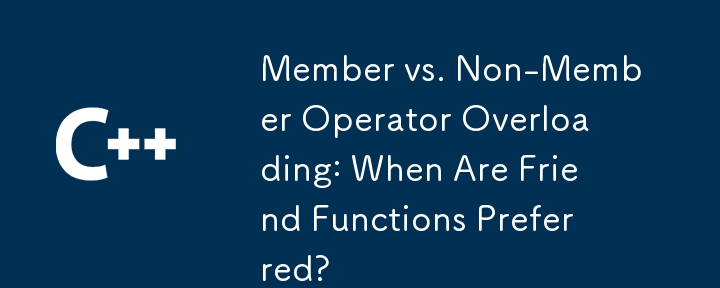

Operator Overloading: Member Function vs. Non-Member Function
In operator overloading, the choice between member and non-member functions raises confusion. While member functions are asymmetric and non-member functions are symmetric, why are friends preferred in certain scenarios?
Member functions can only accept one explicit parameter, as the this pointer is automatically passed to represent the invoking object. This asymmetry limits comparison to situations where the member function is invoked on the left operand. However, this approach fails when the left operand is not a class type, such as attempting to compare a double to a Sample object.
To address this limitation, friend functions can be used to overload operators. Friend functions have access to private members of the class, allowing them to handle operator overloading without the asymmetry restriction. The compiler translates an expression like 10.0 s2 to operator (10.0, s2) when a friend function is employed.
STL algorithms prefer symmetric versions because they enable comparisons in both directions, removing the need for explicit ordering in the operands. However, non-member functions should be used when possible to enhance encapsulation, as friend functions allow access to private members.
In summary, member functions are used for operators where the class instance is always involved as the left operand, while friend functions handle situations where the class instance can be either operand. For greater flexibility and encapsulation, non-member functions should be preferred when not accessing private members.
The above is the detailed content of Member vs. Non-Member Operator Overloading: When Are Friend Functions Preferred?. For more information, please follow other related articles on the PHP Chinese website!
 How to download and save today's headline videos
How to download and save today's headline videos
 The difference between windows hibernation and sleep
The difference between windows hibernation and sleep
 How to solve Java large file read exception
How to solve Java large file read exception
 what is dandelion
what is dandelion
 What are the benefits of java factory pattern
What are the benefits of java factory pattern
 What does Linux mean?
What does Linux mean?
 Introduction to SSL detection tools
Introduction to SSL detection tools
 What are the data backup software?
What are the data backup software?
 How to unlock android permission restrictions
How to unlock android permission restrictions




